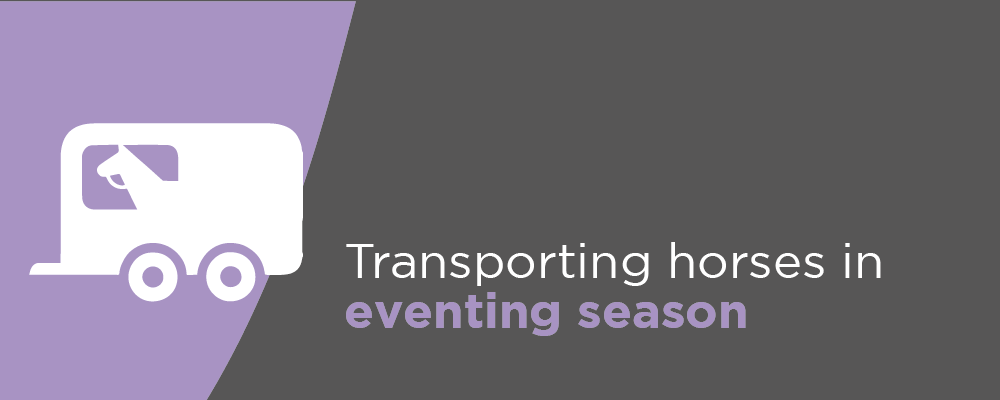- Basildon 01268244144
- Chelmsford 01245453800
- Colchester 01206217300
- London 020 4586 1280

If you own horses - especially if you compete - you will know that we are in the midst of the eventing season. Whether competing at Hickstead, Badminton or in local events, there are various rules and regulations regarding the transportation of horses. It’s important to understand these fully to ensure that you are not committing a criminal offence, as if you do, you could be fined or end up before the Court or Traffic Commissioner.
When transporting a horse in a horsebox or trailer, you should ask yourself:
Do I have the right driving licence for the weight of my vehicle and trailer?
Do I need an operator licence?
Am I going to be transporting the horse(s) for more than eight hours and, if so, am I qualified to do so?
Does my vehicle and/or trailer have a valid MOT certificate?
Driving licences
Having the correct driving licence for the size and type of vehicle you are driving is essential. If you obtained your Category B licence (a standard car driving licence) before 1 January 1997, you are eligible to tow trailers if the Maximum Authorised Mass (“MAM”) does not exceed 3.5 tonnes, as your licence includes an automatic entitlement to drive these Category C1 vehicles. If you obtained your licence after this date, a Category B licence will allow you to tow a trailer up to 750kg where the total weight of the vehicle and trailer does not exceed 3.5 tonnes. You would need a Category B+E licence to tow a trailer in excess of 750kg.
If you are driving a 3.5 tonne horsebox (as opposed to a vehicle and trailer) on public roads, you need a Category C1 licence, which allows you to drive vehicles between 3.5 and 7.5 tonnes without trailers in tow.
For clarity, here is a definition of MAM: ‘maximum authorised mass (MAM) means the weight of a vehicle or trailer including the maximum load that can be carried safely when it is being used on the road[1]’.
Driving a horsebox that is overloaded is an offence that can lead to a fixed penalty of between £100 and £300 or criminal prosecution. Alongside offences of overloading, if you are driving a horsebox or a trailer without the correct category of driving licence you could be liable for prosecution and for driving without insurance (as your incorrect licence will invalidate your insurance).
Operator licences
You should also consider whether you need an operator licence. This would be the case if you are driving a horsebox, or a vehicle and horse trailer, and you either:
Are paid money (directly or indirectly) to transport horses
Receive payment (directly or indirectly, for example a share of prize money) as a result of transporting horses
Use the horseboxes for a professional activity.
If you are transporting horses or goods for non-commercial purposes, such as leisure activities, you are unlikely to require an operator licence. The same applies if the equestrian activity is not connected to a business and is a hobby, or your expenditure is more than you could possibly receive in prize money.
The type of vehicle you own, where you use it and who the horse belongs to will influence the type of licence you require. Here is a summary of the three types of licences and the scenario each one allows:
Restricted Licence
You use a vehicle and horsebox trailer combination or a horsebox that has a MAM over 3.5 tonnes.
You own the horses you are transporting.
Standard National Licence
You use a vehicle and horsebox trailer combination or a horsebox that has a MAM over 3.5 tonnes.
You do not own the horses you are transporting.
You are transporting the horses within the UK only.
Standard International Licence
You use a vehicle and horsebox trailer combination or a horsebox that has a MAM over 3.5 tonnes.
You do not own the horses you are transporting.
You are transporting the horses outside of the UK.
The Driver and Vehicle Standards Agency (DVSA) often carry out roadside vehicle checks, and if you do not have the correct licence, or your vehicle is overweight, you could be committing a criminal offence and you risk your vehicle being impounded. If you are found to be transporting a horse without the necessary operator licence, the vehicle could be impounded and scrapped after 21 days unless an appeal is launched to the Local Traffic Commissioner. The operator could also be fined up to £5,000.
As is evident here, it always pays to check that you are within the law before you get behind the driving wheel and head off to an event with your horse. If you have any questions about this article or you need help with advice surrounding the transportation of horses, or any other equine-related or regulatory matters, please contact Charlotte Burkert (Equine) on 01245 453844 or charlotte.burkert@birkettlong.co.uk or Zoe Hosking (Regulatory) on 01206 217323 or zoe.hosking@birkettlong.co.uk.



Comments